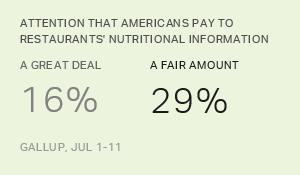Story Highlights
- Four in 10 Americans have personally tried plant-based meats
- The upper-income, young adults and suburbanites most likely to have tried
- Most who have tried plant-based meats say they will likely eat them again
WASHINGTON, D.C. -- Forty-one percent of Americans report having personally tried a plant-based meat, with age being the biggest factor in whether they have done so. About half of adults younger than 50, versus 26% of those 65 and older, have eaten a plant-based meat.
| Yes | No | ||||||||||||||||||||||||||||||||||||||||||||||||||||||||||||||||||||||||||||||||||||||||||||||||||
|---|---|---|---|---|---|---|---|---|---|---|---|---|---|---|---|---|---|---|---|---|---|---|---|---|---|---|---|---|---|---|---|---|---|---|---|---|---|---|---|---|---|---|---|---|---|---|---|---|---|---|---|---|---|---|---|---|---|---|---|---|---|---|---|---|---|---|---|---|---|---|---|---|---|---|---|---|---|---|---|---|---|---|---|---|---|---|---|---|---|---|---|---|---|---|---|---|---|---|---|
| % | % | ||||||||||||||||||||||||||||||||||||||||||||||||||||||||||||||||||||||||||||||||||||||||||||||||||
| U.S. adults | 41 | 59 | |||||||||||||||||||||||||||||||||||||||||||||||||||||||||||||||||||||||||||||||||||||||||||||||||
| Men | 39 | 61 | |||||||||||||||||||||||||||||||||||||||||||||||||||||||||||||||||||||||||||||||||||||||||||||||||
| Women | 43 | 57 | |||||||||||||||||||||||||||||||||||||||||||||||||||||||||||||||||||||||||||||||||||||||||||||||||
| Whites | 42 | 58 | |||||||||||||||||||||||||||||||||||||||||||||||||||||||||||||||||||||||||||||||||||||||||||||||||
| Nonwhites | 38 | 62 | |||||||||||||||||||||||||||||||||||||||||||||||||||||||||||||||||||||||||||||||||||||||||||||||||
| 18-29 | 47 | 53 | |||||||||||||||||||||||||||||||||||||||||||||||||||||||||||||||||||||||||||||||||||||||||||||||||
| 30-49 | 50 | 50 | |||||||||||||||||||||||||||||||||||||||||||||||||||||||||||||||||||||||||||||||||||||||||||||||||
| 50-64 | 38 | 62 | |||||||||||||||||||||||||||||||||||||||||||||||||||||||||||||||||||||||||||||||||||||||||||||||||
| 65+ | 26 | 74 | |||||||||||||||||||||||||||||||||||||||||||||||||||||||||||||||||||||||||||||||||||||||||||||||||
| Household income $100,000+ | 54 | 46 | |||||||||||||||||||||||||||||||||||||||||||||||||||||||||||||||||||||||||||||||||||||||||||||||||
| Household income $40,000-<$100,000 | 44 | 56 | |||||||||||||||||||||||||||||||||||||||||||||||||||||||||||||||||||||||||||||||||||||||||||||||||
| Household income less than $40,000 | 31 | 69 | |||||||||||||||||||||||||||||||||||||||||||||||||||||||||||||||||||||||||||||||||||||||||||||||||
| East | 42 | 58 | |||||||||||||||||||||||||||||||||||||||||||||||||||||||||||||||||||||||||||||||||||||||||||||||||
| Midwest | 41 | 59 | |||||||||||||||||||||||||||||||||||||||||||||||||||||||||||||||||||||||||||||||||||||||||||||||||
| South | 36 | 64 | |||||||||||||||||||||||||||||||||||||||||||||||||||||||||||||||||||||||||||||||||||||||||||||||||
| West | 48 | 52 | |||||||||||||||||||||||||||||||||||||||||||||||||||||||||||||||||||||||||||||||||||||||||||||||||
| City residents | 38 | 62 | |||||||||||||||||||||||||||||||||||||||||||||||||||||||||||||||||||||||||||||||||||||||||||||||||
| Suburb residents | 49 | 51 | |||||||||||||||||||||||||||||||||||||||||||||||||||||||||||||||||||||||||||||||||||||||||||||||||
| Rural/Town residents | 39 | 61 | |||||||||||||||||||||||||||||||||||||||||||||||||||||||||||||||||||||||||||||||||||||||||||||||||
| Â鶹´«Ã½AV, Sept. 16-30, 2019 | |||||||||||||||||||||||||||||||||||||||||||||||||||||||||||||||||||||||||||||||||||||||||||||||||||
Household income is also a significant predictor of plant-based meat consumption, as the majority of adults in upper-income households (54%) have tried such meat replacements, compared with less than a third of those in lower-income households (31%).
Geography also makes a difference. Americans who live in suburban areas (49%) and those who live in the West (48%) are more likely than their counterparts to have tried a plant-based meat.
These data are from a Sept. 16-30 Â鶹´«Ã½AV poll.
Half of Americans Are Familiar With Plant-Based Meats
Public awareness of plant-based meats is substantial, but has a way to go to reach full exposure. Half of Americans say they are "very" (17%) or "somewhat familiar" (33%) with these products. About the same proportion are not very familiar with them, including 30% who say they are not familiar at all with them.
| Very familiar | Somewhat familiar | Not too familiar | Not familiar at all | ||||||||||||||||||||||||||||||||||||||||||||||||||||||||||||||||||||||||||||||||||||||||||||||||
|---|---|---|---|---|---|---|---|---|---|---|---|---|---|---|---|---|---|---|---|---|---|---|---|---|---|---|---|---|---|---|---|---|---|---|---|---|---|---|---|---|---|---|---|---|---|---|---|---|---|---|---|---|---|---|---|---|---|---|---|---|---|---|---|---|---|---|---|---|---|---|---|---|---|---|---|---|---|---|---|---|---|---|---|---|---|---|---|---|---|---|---|---|---|---|---|---|---|---|---|
| % | % | % | % | ||||||||||||||||||||||||||||||||||||||||||||||||||||||||||||||||||||||||||||||||||||||||||||||||
| U.S. adults | 17 | 33 | 19 | 30 | |||||||||||||||||||||||||||||||||||||||||||||||||||||||||||||||||||||||||||||||||||||||||||||||
| Â鶹´«Ã½AV, Sept. 16-30, 2019 | |||||||||||||||||||||||||||||||||||||||||||||||||||||||||||||||||||||||||||||||||||||||||||||||||||
Beyond the novelty factor, the visibility plant-based meats have achieved may be attributable to the partnerships established with popular restaurant chains like Burger King and Hardee's. Two companies, Impossible Foods and Beyond Meat, sell their products in U.S. grocery stores and appear as options in delivered meal kits like Blue Apron.
Familiarity with plant-based meats is likely to grow as U.S. food markets continue to cater to seekers of the nonmeat foods. From a global perspective, financial services company UBS projects that the plant-based meat industry could balloon to $85 billion in sales by 2030 from $4.6 billion in 2018, with 28% percent annual increases.
Most Who Have Tried Plant-Based Meats Are Likely to Eat Them Again
Six in 10 Americans who have personally tried plant-based meats say they are "very" (27%) or "somewhat likely" (33%) to continue eating them. Those not inclined to give plant-based meats another try are about evenly divided between those who are not too likely to try them again (22%) and those not at all likely (18%).
Across nearly all subgroups, the majority of those who have tried plant-based meats say they are at least somewhat likely to continue eating them. Women and younger adults are especially likely to be repeat customers.
| Very likely | Somewhat likely | Not too likely | Not likely at all | ||||||||||||||||||||||||||||||||||||||||||||||||||||||||||||||||||||||||||||||||||||||||||||||||
|---|---|---|---|---|---|---|---|---|---|---|---|---|---|---|---|---|---|---|---|---|---|---|---|---|---|---|---|---|---|---|---|---|---|---|---|---|---|---|---|---|---|---|---|---|---|---|---|---|---|---|---|---|---|---|---|---|---|---|---|---|---|---|---|---|---|---|---|---|---|---|---|---|---|---|---|---|---|---|---|---|---|---|---|---|---|---|---|---|---|---|---|---|---|---|---|---|---|---|---|
| % | % | % | % | ||||||||||||||||||||||||||||||||||||||||||||||||||||||||||||||||||||||||||||||||||||||||||||||||
| U.S. adults | 27 | 33 | 22 | 18 | |||||||||||||||||||||||||||||||||||||||||||||||||||||||||||||||||||||||||||||||||||||||||||||||
| Men | 20 | 32 | 25 | 22 | |||||||||||||||||||||||||||||||||||||||||||||||||||||||||||||||||||||||||||||||||||||||||||||||
| Women | 33 | 33 | 19 | 15 | |||||||||||||||||||||||||||||||||||||||||||||||||||||||||||||||||||||||||||||||||||||||||||||||
| Whites | 25 | 31 | 21 | 22 | |||||||||||||||||||||||||||||||||||||||||||||||||||||||||||||||||||||||||||||||||||||||||||||||
| Nonwhites | 32 | 36 | 23 | 8 | |||||||||||||||||||||||||||||||||||||||||||||||||||||||||||||||||||||||||||||||||||||||||||||||
| 18-29 | 34 | 32 | 25 | 9 | |||||||||||||||||||||||||||||||||||||||||||||||||||||||||||||||||||||||||||||||||||||||||||||||
| 30-49 | 29 | 32 | 20 | 18 | |||||||||||||||||||||||||||||||||||||||||||||||||||||||||||||||||||||||||||||||||||||||||||||||
| 50-64 | 21 | 33 | 22 | 25 | |||||||||||||||||||||||||||||||||||||||||||||||||||||||||||||||||||||||||||||||||||||||||||||||
| 65+ | 21 | 35 | 20 | 24 | |||||||||||||||||||||||||||||||||||||||||||||||||||||||||||||||||||||||||||||||||||||||||||||||
| Household income $100,000+ | 29 | 34 | 19 | 17 | |||||||||||||||||||||||||||||||||||||||||||||||||||||||||||||||||||||||||||||||||||||||||||||||
| Household income $40,000-<$100,000 | 28 | 29 | 24 | 18 | |||||||||||||||||||||||||||||||||||||||||||||||||||||||||||||||||||||||||||||||||||||||||||||||
| Household income less than $40,000 | 22 | 36 | 23 | 19 | |||||||||||||||||||||||||||||||||||||||||||||||||||||||||||||||||||||||||||||||||||||||||||||||
| East | 27 | 37 | 20 | 16 | |||||||||||||||||||||||||||||||||||||||||||||||||||||||||||||||||||||||||||||||||||||||||||||||
| Midwest | 29 | 29 | 24 | 18 | |||||||||||||||||||||||||||||||||||||||||||||||||||||||||||||||||||||||||||||||||||||||||||||||
| South | 24 | 31 | 26 | 20 | |||||||||||||||||||||||||||||||||||||||||||||||||||||||||||||||||||||||||||||||||||||||||||||||
| West | 30 | 35 | 18 | 18 | |||||||||||||||||||||||||||||||||||||||||||||||||||||||||||||||||||||||||||||||||||||||||||||||
| City residents | 32 | 29 | 23 | 16 | |||||||||||||||||||||||||||||||||||||||||||||||||||||||||||||||||||||||||||||||||||||||||||||||
| Suburb residents | 27 | 38 | 20 | 15 | |||||||||||||||||||||||||||||||||||||||||||||||||||||||||||||||||||||||||||||||||||||||||||||||
| Rural/Town residents | 23 | 30 | 22 | 25 | |||||||||||||||||||||||||||||||||||||||||||||||||||||||||||||||||||||||||||||||||||||||||||||||
| Â鶹´«Ã½AV, Sept. 16-30, 2019 | |||||||||||||||||||||||||||||||||||||||||||||||||||||||||||||||||||||||||||||||||||||||||||||||||||
Bottom Line
Economists' projections of high growth for the plant-based meat industry appear well-founded, given the initial level of interest Â鶹´«Ã½AV has measured. The fact that around 60% of those who have eaten plant-based meat would do so again is good news for a young industry seeking to expand.
And the timing is right. Many Americans report a reduction in their meat consumption for health, environmental or other reasons, so plant-based meats -- or the half-meat/half-plant meat products some are experimenting with -- could be poised for an even greater takeoff.
However, even the occasional addition of plant-based meats to Americans' diet could have a seismic impact on the meat industry. It won't be a death knell -- 97% of Americans do eat meat -- and it could be an opportunity to open new markets. Indeed, meat producers and retailers could seize on the interest in plant-based meat and maintain the omnivore market by offering plant-based meats alongside animal products. But plant-based meats are unfamiliar to half of Americans. Turning those consumers into customers -- and, ideally, repeat customers -- requires product availability and interest.
To do so, businesses must develop a well-coordinated value chain, from suppliers to the consumer. Every link in that value chain is important, but Â鶹´«Ã½AV finds real problems in the B2B channel: . Leaders would do well to concentrate on their B2B relationships to align each link in the value chain to a customer-centric vision and purpose. Without that cohesion, plant-based meats may have trouble meeting market demand -- or creating it.
View complete question responses and trends.
Learn more about how the works.




